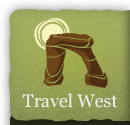Zion Zoology
Beyond the spectacular scenery that showcases red rocks, mighty cliffs, small slot canyons, and spontaneous spouting waterfalls, the wildlife of Zion National Park adds excitement. The opportunity to spot animals draws people to the park as does the scenery for others.
Those who visit the park will have an opportunity to see more than 250 species of birds – including the American kestrel, black-headed grosbeak, and American dipper – fly through the sky and the canopy over the Zion Canyon floor. Hikers might see a gray fox or cottontail rabbit scurry around; however, the most likely spotting would be of a squirrel. The more keen eye may spot a reptile as they visit the park. Zion is home to reptiles like desert horned lizards, collared lizard, and western whiptails. Those who hike
Perhaps the most important thing to remember concerning Zion fauna is the proper rules of interaction with these animals. The three cardinal rules are don’t feed them, don’t touch them, and keep your distance. First, feeding the animals does not help them because they must ultimately rely on their own foraging skills to survive, and if they are spoiled by humans feeding them, they may fatally loose their natural skills. Also foods that humans consume may not bode well with the animals. Second, touching the animals puts both parties at risk. Animals may bite if they feel threatened, and they carry diseases that can cause many complications in humans. If animals have a human scent on them, this scent may scare animals away from the animals. Third, keeping distance helps prevent any misunderstanding between animals and humans. Besides if humans are not close to animals, how can they feed or touch them?
Did you like this page? Did you find it helpful? Please consider sharing.
